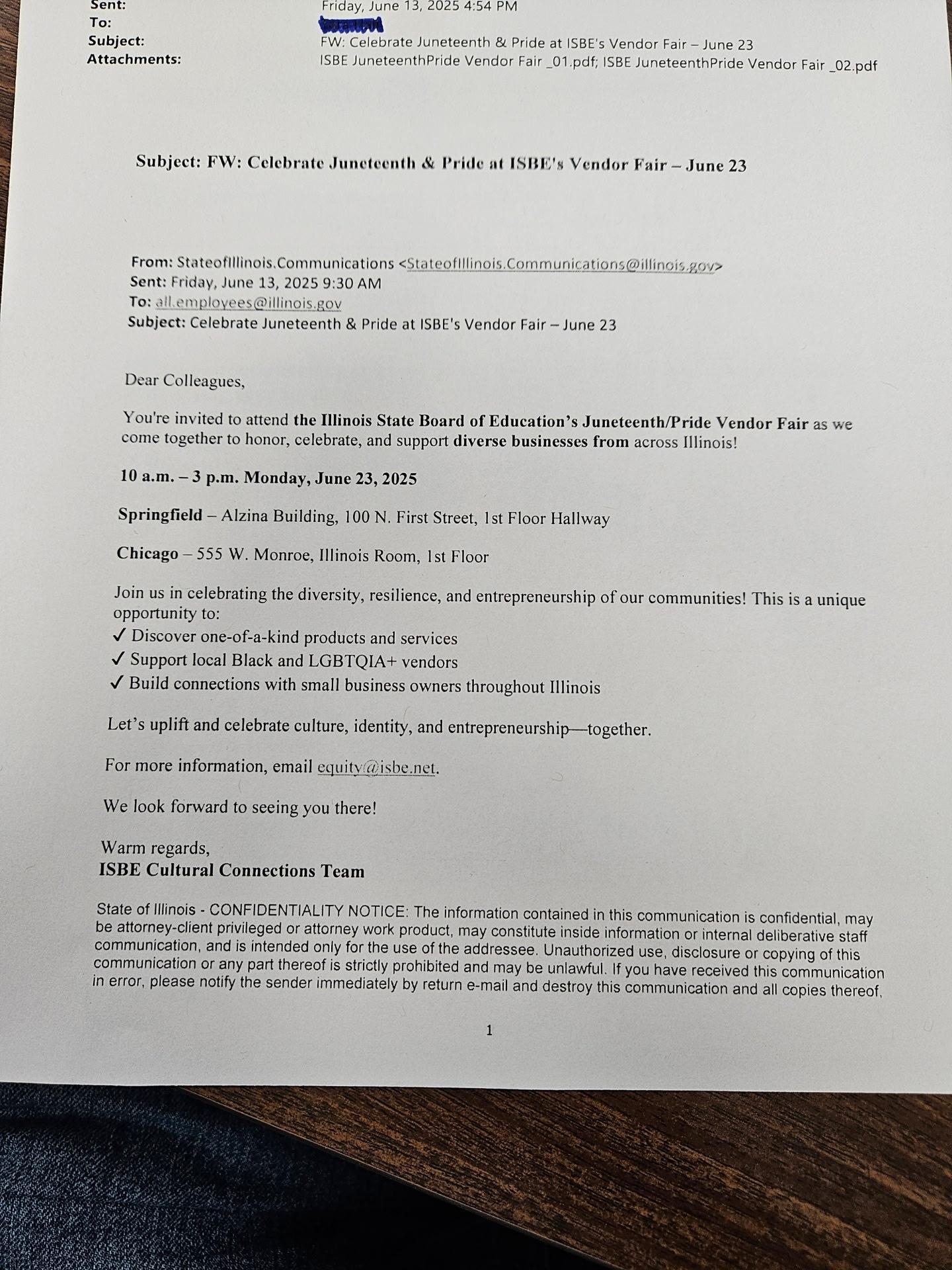Dr. Tony Sanders, State Superintendent of Education. | Illinois State Board of Education
Dr. Tony Sanders, State Superintendent of Education. | Illinois State Board of Education
The Illinois State Board of Education (ISBE) has announced a Juneteenth and Pride Vendor Fair to celebrate and uplift Black-owned and LGBTQIA+ businesses exclusively, according to internal communications shared with Chicago City Wire.
The event aims to “honor, celebrate, and support Black and LGBTQIA+ entrepreneurs,” according to ISBE materials, effectively excluding vendors outside those groups.
“In honor of Juneteenth and Pride Month, the Illinois State Board of Education (ISBE) is hosting a Vendor Fair to celebrate and uplift Black-owned and LGBTOIA+ businesses,” the ISBE said in a flyer meant for potential fair vendors.
The event, scheduled from 10 a.m. to 3 p.m. at ISBE locations in Springfield and Chicago, is designed to showcase “diverse businesses” and “celebrate the resilience and entrepreneurship” of Black and LGBTQIA+ communities.
The official vendor call-out specifically seeks at least nine vendors at each location representing these groups, with no invitation extended to white-owned or non-LGBTQIA+ businesses.
Questions remain about whether such exclusionary policies could run afoul of anti-discrimination laws, especially in government-sponsored events.
The discriminatory nature of the fair comes as Illinois faces potential loss of $6.4 billion in federal education funding—including nearly $1 billion for Chicago Public Schools—due to its continued promotion of diversity, equity and inclusion (DEI) policies.
On his second day upon returning to office President Donald Trump signed an executive order titled "Ending Illegal Discrimination and Restoring Merit-based Opportunity.”
Trump’s executive order aims to eliminate what it describes as illegal race- and sex-based discrimination embedded in DEI programs across federal agencies and private institutions. It revokes several prior DEI-related executive orders, bans affirmative action in federal contracting, and mandates that compliance with anti-discrimination laws directly affect funding decisions.
Financially, the order targets billions in federal grants, contracts and student aid by tying eligibility to certified non-participation in DEI programs deemed discriminatory.
Additionally, it authorizes federal agencies to investigate large organizations and institutions for potential violations, prioritizing merit-based standards over identity-based preferences.
“Illegal DEI and DEIA policies not only violate the text and spirit of our longstanding Federal civil-rights laws, they also undermine our national unity, as they deny, discredit, and undermine the traditional American values of hard work, excellence, and individual achievement in favor of an unlawful, corrosive, and pernicious identity-based spoils system,’ the executive order reads. “Hardworking Americans who deserve a shot at the American Dream should not be stigmatized, demeaned, or shut out of opportunities because of their race or sex.”
Subsequently, the U.S. Department of Education has warned that funding could be withheld if the ISBE or local schools violate Title VI of the Civil Rights Act, which prohibits discrimination based on race, color or national origin in federally funded programs.
Under Title VI, recipients of federal funds cannot exclude individuals, deny them benefits or subject them to discrimination based on these protected characteristics.
“The Federal Government must hold itself to at least the same principles of nondiscrimination in educational opportunities as it applies to the education programs and activities of State and local governments, and to private institutions receiving Federal financial assistance,” Title VI reads.
Despite the billions at stake statewide, Gov. JB Pritzker and Chicago Mayor Brandon Johnson have continued to push back to maintain DEI standards.
Meanwhile, critics argue that many DEI efforts, such as racially exclusive grants and hiring preferences, now mirror the very discrimination early civil rights leaders fought against.








 Alerts Sign-up
Alerts Sign-up